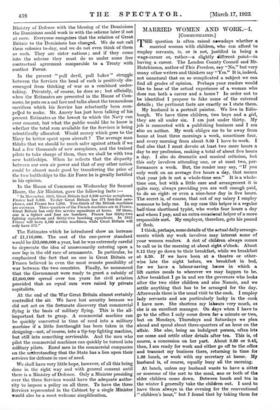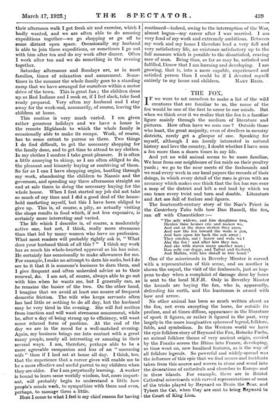T ' question is often • raised- nowadays whether a married
woman with children, who can afford to employ servants, is; or is not, justified in being a wage-earner or, rather—a slightly different - point-4n having, a career. The London County Council and Mr.
Hutchinson, author-of This Freedom, say "No," but very many other writers end thinkers say "Yes." It is, indeed. not unnatural that on so complicated a subject we can find all grades of opinion- Perhaps- your readers would like to hear of 'the actual experience- of a woman- who does run both a career and a home ? In order not to be identified I propose- to fake some of the external details ; the pertinent facts are exactly as I state them.
My husband is a portrait painter. We live in Edin- burgh. We have three children, two boys and a girl, they are all under six. I am just under thirty. My job is connected with a publishing business and I am also an author. My work obliges me to be away from home at least three_ mornings a week,. sometimes four, and every morning from about 9.30 I have to work. I find also that I must devote at least two more hours a day to my profession, making a total of-about five hours a day. I also do dramatic and musical criticism, but this only involves attending • one, or at most two, per- formances a week. But, the reader may say, "If you only work on an average five hours a day, that means that your job is not a whole-time -one." It is a whole- time one, but with a little care and arrangement it is quite easy, always providing you are well enough paid, to do an eight- or even a nine-hour day in five hours. The secret is, of course, that out of my salary I employ someone to help me. In my case this helper. is. a regular half-time shorthand typist, who works four hours a day and whom I pay; and an extra occasional helper of a _more responsible sort. My employer, therefore, gets his pound of flesh.
I •think, perhaps, somedetails of the actual daily arrange- ments which my work involves may interest some of your women readers. A riot of children always comes to call us in the morning at -about eight &dock. About 8.15 they go down to -their breakfast, while we breakfast at 8.30. If we have been at a theatre or other- wise late the night before, we breakfast in bed, for we have a labour-saving house in which a lift- carries meals to wherever we may happen to be. After breakfast I go in - and see -the -governess who looks after the two elder children and also Nannie, and we settle anything that has- to be arranged for the day. Afterwards there is the usual visit to the cook. I-employ lady servants and am particularly lucky in- the- cook I have now: She shortens my lalrours very much, as she is an- excellent- manager. On days when I have to go to the office I only come down for -a -minute-or-two, but on Mondays, Thursdays and Saturdays we plan ahead and spend about three-quarters of an hour on the affair. She also, being an indulgent person, often lets me -come and settle other details after tea. This is, of course, a concession on her part. About 9.30 or 9.45, then, I am- ready for work and either go off to the office and transact my business there, returning in time for 1.30 lunch, or work with my secretary at home.- My husband is, of course, equally busy all the morning.
At lunch, unless- my husband wants to have a sitter or- someone of the sort to the meal, one or both of the elder children come down. Between lunch and tea in the winter I generally take the children out. I used to have them always in the evening for the conventional -" children's hour," but I found- that by taking them for their afternoon walk I got fresh air and exercise, which I badly wanted, and we are often able to do amusing expeditions together—we go shopping or go off to some distant open space. Occasionally my husband is able to join these expeditions, or sometimes I go out with him after tea and do my work after dinner. Often I work after tea and we do something in the evening together.
Saturday afternoons and Sundays are, as in most families, times of relaxation and .amusement. Some- times in .the summer the whole fa mily goes to a standing camp that we have arranged for ourselves within a motor drive of the town. This is great fun ; the children dress up as Red Indians and I cook or, if I feel slack, take food ready prepared. Very often my husband and I stay away for the week-end, necessarily, of course, leaving the children at home.
This routine is very much varied. I am given rather generous holidays and we have a house in the remote Highlands to which the whole family is occasionally able to make its escape. Work, of course, has 'to -some extent to pursue us there. Two things I do _find difficult, to get the necessary shopping for the family done, and to get time to attend to my clothes. In my clothes I confess I take great pleasure. It is often a little annoying to skimp, as I am often obliged to do, the pleasant and leisurely buying or contriving of them. So far as I can I have shopping orgies, bustling through my -work, abandoning the children to Nannie and the governess, and spending say three afternoons straight on end at sale times in- doing the necessary bu.ying for. the whole house. When I first started my job did not take so much of my time and I did a good deal of the house- hold marketing myself, but this I , have ,been obliged to give up. This is, of course, a pity, as actually visiting the shops results in food which, .if not less - expensive, is certainly more -interesting and varied.
-The life which I describe is, of- course, a moderately active one, but not, I think, really more strenuous than that led by many women who have no profession.
What most readers will probably rightly ask is, " What does your husband think of all this ? " I think my work has as much his whole-hearted approval as his has mine.
He certainly has occasionally to make-allowances for me. For example, I make no attempt to darn his socks, but I do see to it that it is. someone's business to darn them, and I give . frequent and often unheeded advice as to their renewal,- &c. I am not, of course, always able to go out with him when he wants .me, but 1 generally can, as he remains the busier of the two. On the other hand, I imagine that we avoid at least one source of frequent domestic friction. The wife who keeps servants often has had little or nothing to do all day, but the husband may be very tired in the evening. She will feel restless from inaction and will want strenuous nmusement, while he, after a day of.being strung Alp to efficiency, will want some relaxed form of pastime. At the end of the day we are in the mood for a well-matched evening.
Again, my business brings me into contact with a great many people, nearly all interesting or amusing in their . several ways. I am, therefore, perhaps able to be a more agreeable companion and less of an " unceasing wife " than if I had sat at home all day. I think, too, that the experience that a career gives will enable me to be a more effective and useful parent to my children when they are older. For I am perpetually learning. A worker is bound to learn some worldly wisdom, but, more import- ant, will probably begin to understand a little how people's minds work, to sympathize with them and even, perhaps, -to manage them a little. Here I come to what I feel is my chief reason for having continued—indeed, owing to the interruption of the War, almost begun—my career after I was married. I am very fond of my-work and extremely ambitious. Between my work and my home I therefore lead a very full and very satisfactory life, an existence satisfactory up to the full measure which is possible to the dissatisfied, craving race of man. Being thus, as far as may be, satisfied and fulfilled, I know that I am learning and developing. I am growing, that is, into a more capable, experienced and satisfied person than I could be if I devoted myself entirely to my home and children. MARY REID.











































 Previous page
Previous page